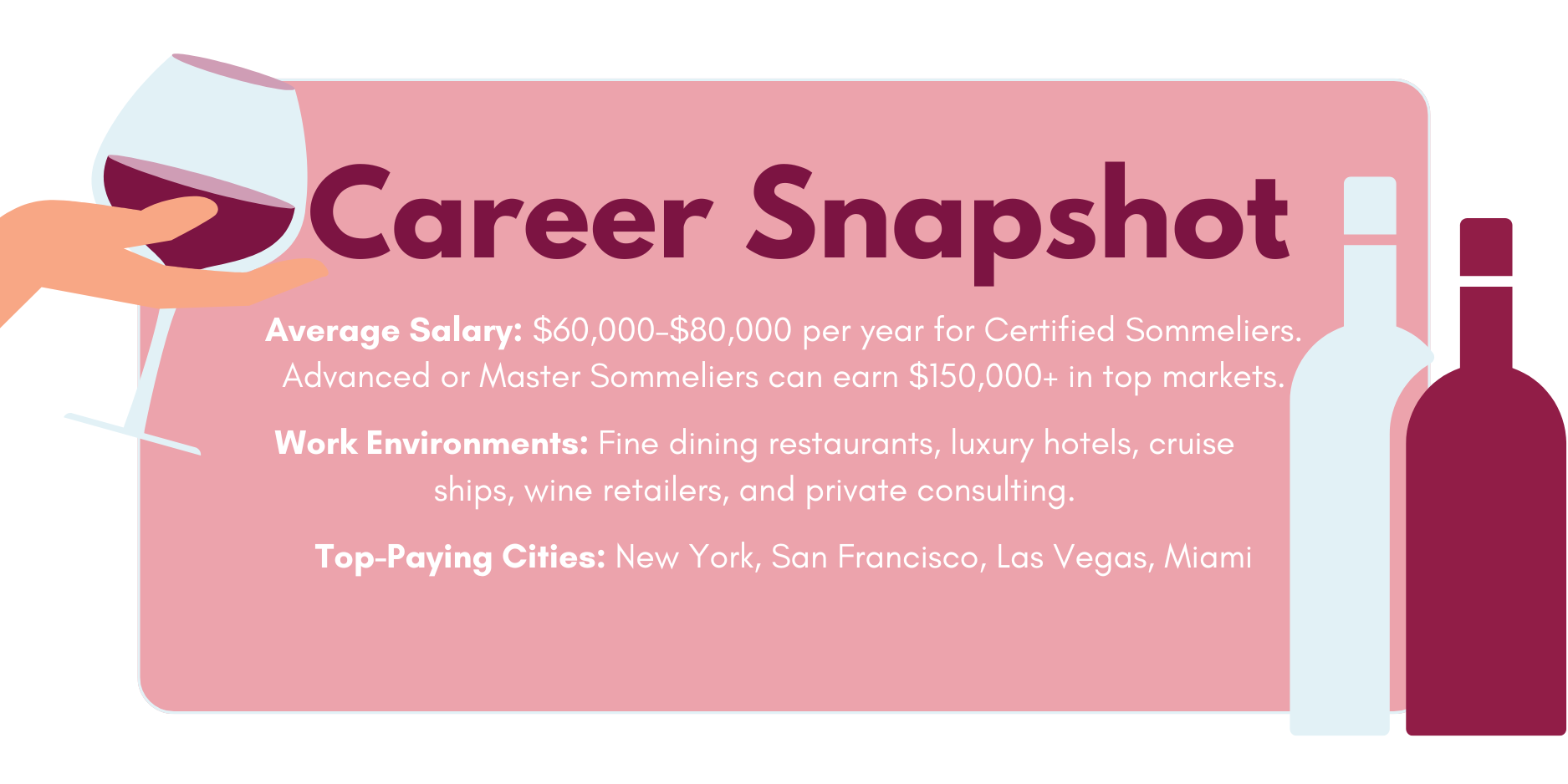Taste, learn, serve—and make your dream job a reality
Sommeliers are storytellers, educators, and curators of unforgettable experiences. Behind every confident pour lies a journey of study, service, and sensory refinement.
Whether you're switching careers, looking to level up in hospitality, or simply obsessed with wine, this guide walks you through what it really takes to wear the sommelier pin.
The First Pour: Start with Curiosity
No one wakes up knowing the difference between Barolo and Barbaresco. Every sommelier begins with questions, a curious palate, and a stack of wine-stained notebooks.
- Read voraciously — Books, wine publications, blogs, and even Reddit threads can reveal surprising insights.
- Taste everything — From bargain bottles to rare vintages, every sip teaches something. Keep notes, revisit old favorites, and challenge your palate.
- Study the world — Wine is geography in a glass. Learn regions, climates, grapes, and the winemakers behind the bottle.
This early stage is messy, thrilling, and deeply personal. Let curiosity guide you.
Step Into the Dining Room
Hospitality is the true training ground for sommeliers. Working on the floor of a restaurant teaches more than any textbook can: how to read a guest, manage chaos, and make someone’s evening extraordinary.
- Start anywhere: Server, busser, bartender, host—all paths count.
- Watch and learn: Observe how seasoned sommeliers interact, present bottles, and navigate pairings.
- Ask questions: Most wine pros are eager to share their passion.
Bonus: You get paid to taste wines and build your network.
Elevate Through Certification
To earn credibility in the wine world—and keep up with its depth—many turn to certification programs. They're challenging, respected, and great for structure.
Most recognized programs include:
- Court of Master Sommeliers (CMS): Service-focused. Progresses through Introductory, Certified, Advanced, and Master levels.
- Wine & Spirit Education Trust (WSET): Globally recognized and academically driven. Levels 1–4, culminating in the Diploma.
- Other options: National Wine School, Society of Wine Educators, and country-specific institutions (like Italy’s AIS or France’s FWS).
Pro Tip: Check out the Wine Industry Careers' Education page for a full list of academies in the US offering degrees, certifications, and individual courses.
The Climb: From Intro to Master
The certification ladder gets steeper with every rung:
- Intro/Level 1: Learn the basics—wine styles, regions, tasting technique.
- Certified/Level 2–3: Expect blind tasting, pairing logic, and service simulations.
- Advanced/Diploma: Dive into obscure regions, complex theory, and precise service.
- Master Level: Only a few hundred in the world wear the Master Sommelier pin. It’s grueling—and legendary.
While not everyone needs to go all the way, advancing shows dedication and unlocks career doors.
Learn to Speak Wine, Not Lecture It
Knowing wine is one thing. Sharing it with warmth and precision is another.
- Skip the jargon: Guests don’t care about malolactic fermentation. Tell them what the wine feels like.
- Master service details: Presenting, pouring, decanting—all require grace and timing.
- Personalize the experience: Great sommeliers recommend wines based on what someone wants, not just what’s on the list.
Step Into the Role
When you're ready to apply for sommelier roles, bring more than a résumé—bring presence.
- Update your materials: Highlight certifications, tasting groups, and hospitality accomplishments.
- Ace the tasting test: Employers often quiz on aroma ID, regional knowledge, and food pairings.
- Consider the setting: Restaurants, hotels, retailers, cruise ships, importers, or even private clients—wine roles are as varied as wine itself.
Keep the Bottle Open
A sommelier’s education never ends. Stay hungry, stay humble.
- Travel when you can: Nothing replaces standing in the vineyard.
- Expand your beverage world: Study sake, beer, spirits, tea—even coffee. Guests expect range.
- Find your niche: Maybe it’s natural wine, Spanish reds, or food writing. Lean in.
The more you taste, explore, and connect, the deeper your expertise grows.
Becoming a sommelier isn’t about memorizing maps or reciting tasting notes. It’s about listening, learning, and lighting someone up with a glass they never expected to love.
And that’s the magic—connecting people to place, memory, and joy, one bottle at a time.
Author’s Note: This article is for aspiring wine professionals seeking clarity, inspiration, and actionable steps. For current certification details or scholarship opportunities, visit the official websites of CMS, WSET, and national wine education organizations.
